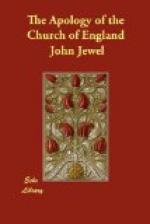Thus therefore teach we the people, that God hath called us, not to follow riot and wantonness, but, as St. Paul saith, “unto good works, to walk in them:” that God hath plucked us out “from the power of darkness, to the end that we should serve the living God;” to cut away all the remnants of sin, and “to work our salvation in fear and trembling:” that it may appear, how that the Spirit of sanctification is in our bodies, and that Christ Himself doth dwell in our hearts.
To conclude, we believe, that this our self-same flesh wherein we live, although it die, and come to dust, yet at the last day it shall return again to life, by the means of Christ’s Spirit which dwelleth in us: and that then verily, whatsoever we suffer here in the meanwhile for His sake, Christ will wipe away all tears and lamentation from our eyes: and that we through Him shall enjoy everlasting life, and shall for ever be with Him in glory. So be it.
PART III.
Behold these are the horrible heresies, for the which, a good part of the world is at this day condemned by the Bishop of Rome; and yet were never heard to plead their cause. He should have commenced his suit rather against Christ, against the Apostles, and against the holy fathers. For these things did not only proceed from them, but were also appointed by them: except perhaps these men will say (as I think they will indeed), that Christ never instituted the Holy Communion to be divided amongst the faithful; or that Christ’s Apostles and the ancient fathers said private masses in every corner of the temples, now ten, now twenty together in one day: or that Christ and His Apostles banished all the common people from the Sacrament of His blood: or that the thing, which they themselves do at this day everywhere, and do it so as they condemn him for a heretic which doth otherwise, is not called of Gelasius, their own doctor, plain sacrilege: or that these be not the very words of Ambrose, Augustine, Gelasius, Theodoret, Chrysostom, and Origen: “The bread and wine in the Sacraments remain still the same they were before:” “The thing which is seen upon the Holy Table is bread;” “There ceaseth not to be still the substance of bread, and nature of wine;” “The substance and nature of bread are not changed;” “The self-same bread, as touching the material substance, goeth into the belly, and is cast out into the privy:” or that Christ, the Apostles, and holy fathers prayed not in that tongue which the people might understand: or that Christ hath not performed all things by that one offering which He once offered: or that the same sacrifice was unperfect, and so now we have need of another. All these things must they of necessity say, unless perchance they had rather say thus, that “all law and right is locked up in the treasury of the Pope’s breast,” and that, as once one of his soothing pages and claw-backs did not stick to say, “The Pope is able to dispense against




